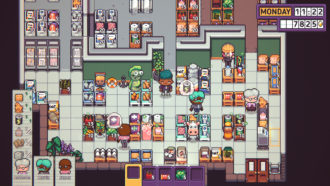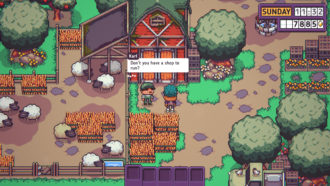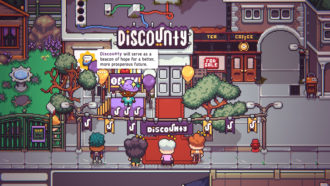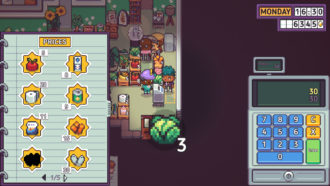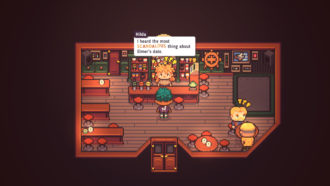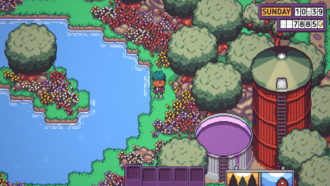Platforms:
Xbox One, PS4, PC, Nintendo Switch, PS5, Xbox Series X|S, Nintendo Switch 2
Released:
August 22, 2025
Publisher:
PQUBE
Developer:
Crinkle Cut Games
Prior to my current job, I worked in retail for a decade. One of the few reasons I was able to leave the house during COVID was to stock shelves and hear customers complain about having to buy a second pasta maker because their first one was stuck at their beach house. I broke down boxes, dealt with problematic bosses and tactfully avoided the regular angry customer. During this period, I actually earned a reputation for being very good at organising the warehouse, meaning I spent most of my shifts out the back quietly arranging stock and checking inventory. This was more than fine by me, given it meant both dealing with fewer customers and being able to indulge in the quiet pleasure I got from satisfying organisation.
I open with this anecdote because Discounty brought me back to those days. Over the last week, I have spent almost every night after work arranging shelves, managing stock levels and fastidiously organising my warehouse. Now, is it good that a video game reminded me of my laborious retail experiences? Probably not! One could argue that labour and play should stay far away from one another, but that has not stopped a wealth of business management sims in recent decades from stealing hundreds of hours of leisure. From the copious amount of Harvest Moon-likes to the massive success of Stardew Valley (as a Harvest Moon-like) to the surprisingly popular Farming Simulator series, video games have long somehow found ways to transform what is ostensibly work into something we apparently want to do in our spare time.
And while Discounty comfortably fits into that trajectory, what makes it a little more interesting than most is the fact that it seems quietly aware of this weirdness. While it may struggle to properly lampoon its chosen genre, this is a management game that simultaneously critiques its entrepreneurial spirit while also still being a well made and mildly addictive shop game, making for an experience that is both at odds with itself and has slightly more going on that I expected when I first booted up its pixelated produce aisle.
Discounty is a shopkeeping simulator developed by new studio Crinkle Cut Games and published by PQube. It follows the player character after they are hired by their aunt to run the ‘Discounty’ branded supermarket in the small town of Blomkest. The player must design and organise their shop, work the till and strike trade deals for new items to sell, alongside managing their personal relationships with residents and uncovering the larger social dynamics in the struggling town. The game plays out across daily cycles where you wake up, complete tasks around the town and work 9-5 at the supermarket.
This setup will be familiar to anyone who has picked up Stardew Valley or any of its contemporary simulation management games in recent years. Looking over the Steam page for Discounty, as I am wont to do prior to reviewing something, much of its genre trappings and systems were immediately recognisable. The only thing that stood out to me was the fact that Discounty, alongside other expected tags like ‘shopkeeper’ and ‘life sim’, was also tagged as ‘satire’. Frankly, that tag compelled me: there is a hell of a lot to satirise in these types of games! The gamifying of labour, the turning of players into little hyperproductive entrepreneurs, and the overall use of ‘cozy’ aesthetics to slip in some very odd underlying messages once you start thinking about them are all things I have seen the genre critiqued for elsewhere. This is something I had already reflected on myself after I became so obsessed with Stardew Valley that I eventually had to stop playing because the pressure to utilise my time each day as efficiently as possible began making me very anxious. This tag, then, set some expectations for me; namely, that I was hoping that Discounty would have a little more going on than being a simple management game.
The reality, however, is more complicated (mild spoilers follow). Discounty’s story does poke some good fun at the ruthless entrepreneurial spirit undergirding these games. As your supermarket grows and you start requesting more and more local produce to sell, the town gets dirtier, rats start to appear, your products begin showing up as litter, and local fishing reserves begin to shrink. Expanding into neighbouring buildings may give you more floor space, but it will also start to piss off the locals who see you as the face of a giant corporate chain slowly encroaching on their business and heritage. Your aunt is a cutthroat capitalist, pursuing growth at all costs to the point of taking out massive loans, dissuading residents from complaining, and even asking you to sabotage a kid’s lemonade stand to avoid competition.
“I was hoping that Discounty would have a little more going on than being a simple management game.”
Written out so starkly, this may make Discounty look blisteringly savage in its critique, but all this story remains couched in a cutesy, cozy aesthetic and some disappointing narrative decisions that round the edges off its bite. While I was originally intrigued by Discounty’s early-game jabs, as you progress, it begins to hedge its bets a little bit, and I was ultimately left disappointed that it never fully committed to its premise. The characters remain jokey and friendly regardless of your actions, the town and your relationships are scarcely affected outside a few plot points and at times it felt too afraid to go beyond its foundations as a conventional shop management game to do something properly interesting. While I admired the attempt, and a few moments dig the knife in a little, Discounty ends up resisting doing anything too satirical or radical in favour of offering some slightly spicy window dressings on an otherwise conventional approach to the genre.
This isn’t helped much by Blomkest’s cast of characters, who are fine and funny enough but a tad underwritten. There are plenty of allusions to interesting interpersonal dynamics or the potential for character growth, but many of them are left underexplored. The random character moments you can encounter roaming around the town do add a level of flavour, though, and while the town is small and a bit empty, the routine of the supermarket and some of its citizens does make it feel more lived-in. The thinness of Discounty’s characters feels tied to its larger storytelling concerns – while they’re broad and somewhat memorable, the lack of robust storylines that allow you to see them develop echoes the placidity of its broader campaign. Particularly contrasted with the beloved roster in Stardew Valley, I don’t think any of them are going to elicit anywhere near as much fan appreciation or affection.
Discounty’s narrative intentions and gameplay also remain fairly siloed from one another. Amidst all this entrepreneurial editorialising, Discounty still encourages the same daily productive grind of 9-to-5 of ordering more stock, serving customers and laying out your store to maximise profits as much as possible. This gameplay loop is simple but unnervingly addictive. Particularly as someone who takes maybe a bit too much pleasure in organisation, I slipped into a familiar and very time-absorbing routine of daily stocking, selling and ordering extremely quickly. None of the mechanics are very complex, but there is a satisfaction to their simplicity. It created an odd gameplay experience that was compelling and made for many ‘just one more day’ evenings while also eliciting a disquieting feeling that this was somewhat at odds with other parts of Discounty.
One of the areas that especially worked for me was managing your supermarket’s layout. I must have rearranged my setup a dozen times in response to new types of shelves or merchandise, trying to find the best and most satisfying layout that made my produce the most appealing. The aesthetic customisation options are a bit limited, though – you can change the floor and wall covering, and there are a handful of nice decorative items to purchase, but the implicit need to prioritise stock turnover does disincentivise placing them over going for yet another shelf of fish fingers. On a base level, stripping away all the real-world labour connotations, organisation like this is something I cannot help but take pleasure in, and Discounty handily scratched that itch regularly over its 20-25 hour campaign.
It is worth noting that Discounty, in its current state, runs fairly well, but is still a tad rough around the edges. The user interface is quite basic, and while I didn’t encounter any game-breaking glitches, customers often behaved in odd ways, or pop-ups would show the incorrect information. None of this meaningfully detracted from my experience, but it is worth mentioning. Overall, Discounty does have the feel of a debut studio game – it’s working in a familiar genre with some added interesting flourishes that I can admire even if they end up a little short of their target. To return briefly to the initial expectations posed by its promotion, I don’t think Discounty effectively satirises the management genre – it’s far too wary of disrupting its central established formula – but it makes a modest attempt that will help me remember it amidst the plenty of other management games released nowadays. There is a thematic tension at the heart of Discounty, a tension it never reconciles, but the fact that it draws attention to that tension at all through what is otherwise a satisfying game is worth recognising and appreciating.
7.5
Good
Positive:
- Simple but satisfying management systems
- Concerningly addictive work cycle
- Pokes fun at the entrepreneurial nature of management games...
Negative:
- ...but the critiques ultimately lack bite
- Townsfolk feel a bit thin
While its spoofing of the management sim lacks bite and its cast of characters is a tad thin, Discounty is otherwise an interesting debut title. Rearranging and optimising the layout of its titular supermarket is simple but unnervingly satisfying, and its daily loop makes for an addictive trip down the pixelated produce aisle, even if I can’t help but be disappointed by the ambition its story lost along the way.
